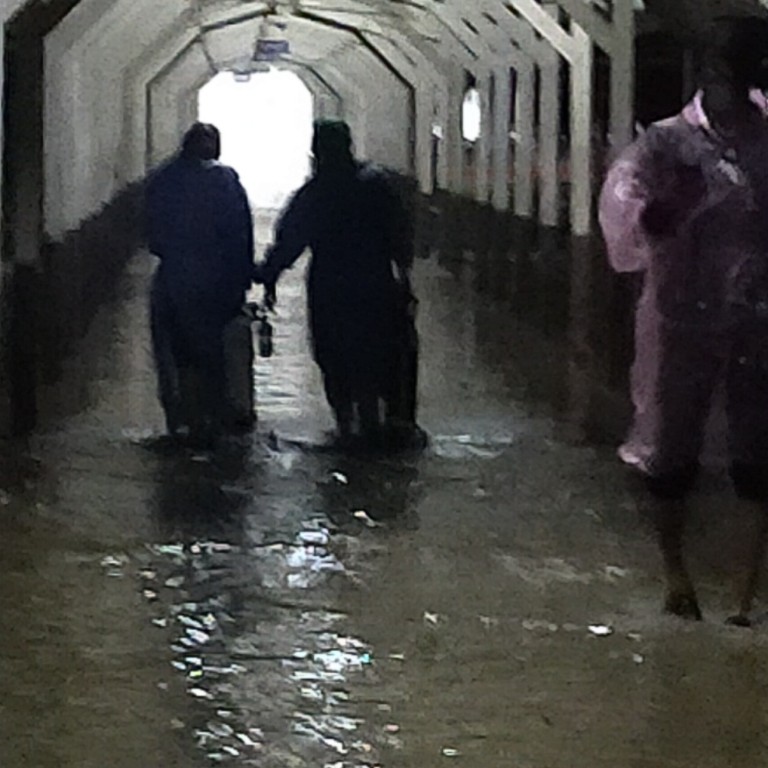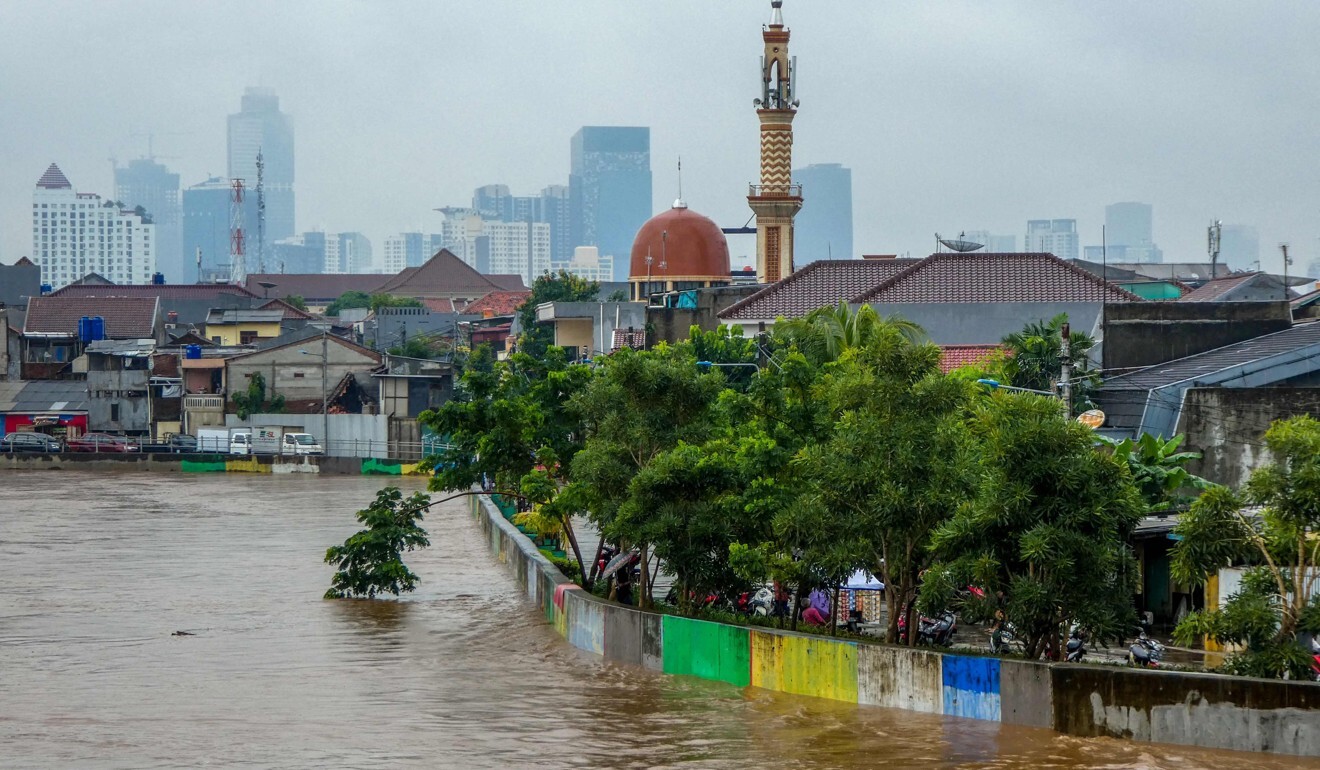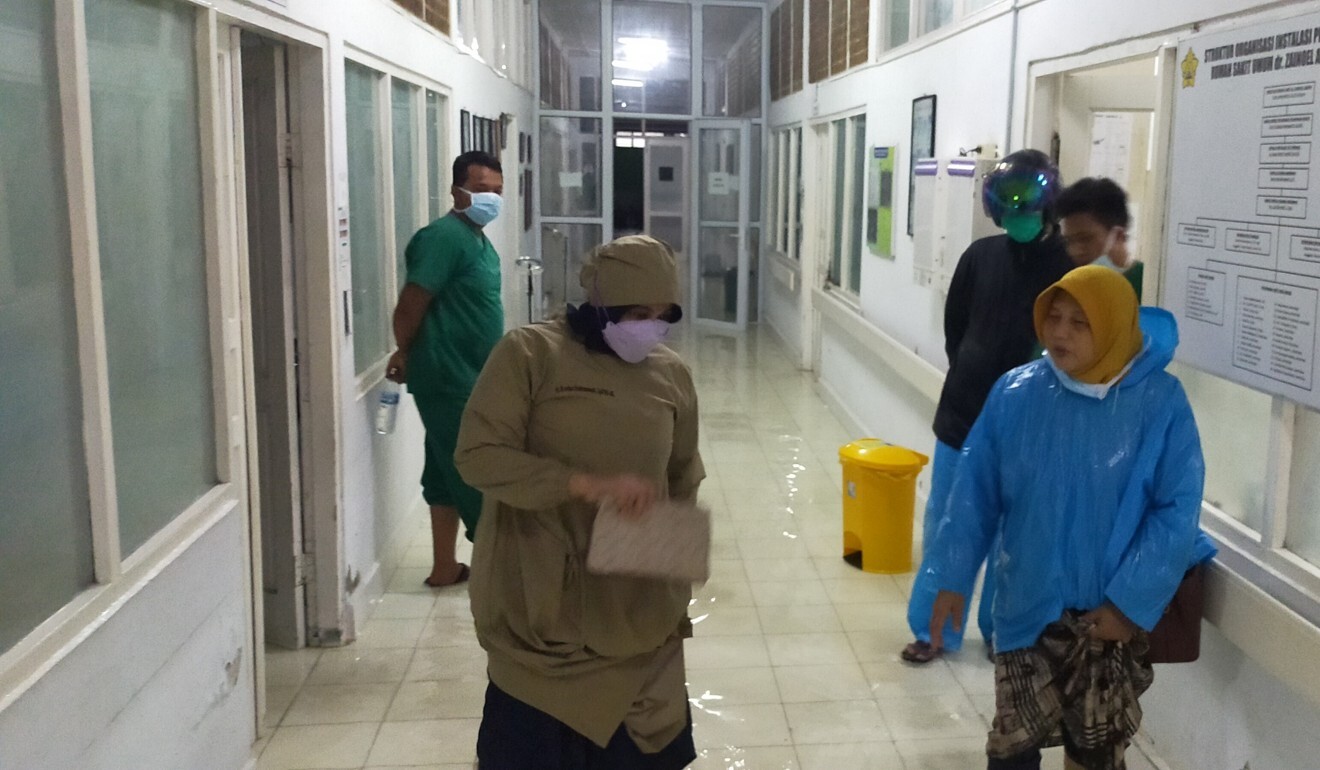
Indonesia fears rainy season as Covid-19 isolation wards flood
- Heavy flooding combined with a Delta-fuelled second wave of the pandemic could overwhelm the health-care system in the disaster-prone country, experts warn
- These fears have been underlined by social media images showing large parts of a hospital in Banda Aceh underwater
The season traditionally stretches from approximately September to April, but heavy rains have already begun to fall in some places, fuelling fears that a combination of the second wave – which has been made worse by the more aggressive Delta variant – and heavy flooding could overwhelm the health-care system, especially in rural areas.
In Aceh province, on the northwest tip of Sumatra island, there are already signs such fears are coming true. Floods that hit the provincial capital of Banda Aceh this week left large parts of Dr Zainoel Abidin General Hospital underwater.
On Tuesday evening, images on social media showed the hospital’s hallways, patient wards and Covid-19 isolation rooms underwater.
“Fortunately, management responded very quickly,” Dr Novina Rahmawati, coordinator of the hospital’s emerging infectious diseases unit, said.
“The duty manager and hospital staff checked the patient rooms immediately and started to evacuate documents and medical records so that they did not get wet or float away. They also provided support to doctors and medical staff and moved some of the patients’ beds to other areas of the hospital. They also brought in pumps to suck out the water.”
Novina said the hospital had also flooded around the same time last year.
Indonesia is prone to severe flooding as a result of heavy annual rains coupled with poor drainage systems and other infrastructure issues such as loss of tree cover, increased sedimentation in rivers, littering and inadequate spatial planning in cities.
In January 2020, 66 people died and more than 60,000 were displaced when heavy rainfall in the capital city of Jakarta caused the Cisadane and Ciliwung rivers to burst. The flooding was Jakarta’s worst since 2007.

“Natural disasters such as [the flooding in Aceh] are going to make the pandemic situation worse,” Dr Dicky Budiman, an Indonesian epidemiologist at Griffith University in Australia, said.
“First of all, flooding will affect patients’ recovery and their daily activities because Covid-19 patients need to be careful about their interactions with other people. They also need to rest so, if they have to be moved, this will be a problem. The same also applies if they are at home and self-isolating which will be arduous, or if they are in quarantine. It is a very difficult situation.”
Novina said the floods at Dr Zainoel Abidin General Hospital had hit several Covid-19 isolation wards, a chemotherapy ward and a tuberculosis ward.
“It was difficult for patients to do things like use the bathrooms, and the waters also cut off access on the ground floor, limiting the movements of doctors and other medical staff. The Covid-19 isolation rooms also have CCTV so that we can monitor the condition of the patients and we had to turn off the CCTV in those rooms as we were worried about the power short-circuiting because of water getting into the electrics,” Novina said.
In new Covid epicentre, Indonesians help each other as trust in government falters
Indonesia, which sits on an active seismic strip known as the Pacific Ring of Fire, is prone to frequent natural disasters.
According to Indonesia’s Disaster Mitigation Agency, 1,714 natural disasters have hit since the start of the year, including forest fires, floods, landslides, earthquakes, tornadoes and droughts. These have killed more than 500 people and left more than 5 million displaced.
Indonesia has also reported more than 3.7 million cases of coronavirus since the start of the pandemic and more than 112,000 deaths, although the true numbers are thought to be higher due to under-reporting.
Across Aceh province, which has a population of over 5 million, more than 1,100 people have died from Covid-19 and over 26,000 cases have been reported.
“The government needs to step in and have a mitigation plan for those areas that are affected,” said Budiman.

“If hospitals can’t be accessed or they can’t provide full health-care facilities for patients, it will cause the public to panic because people will not be able to access the care they need and it could end in more fatalities. Those who are already in hospital will also not be able to get the standard of care that they usually would and will need to be moved.”
Budiman said areas outside Java such as Aceh would find this particularly challenging, as there were a limited number of facilities.
In Banda Aceh, there are only four designated Covid-19 hospitals for a population of over 250,000, all of which were listed as full on the Ministry of Health website as of August 12.
Are Indonesia’s new coronavirus measures strict enough to curb the Delta-surge?
At Dr Zainoel Abidin General Hospital, Novina said that while the floodwaters had subsided for now, staff were working on a comprehensive evacuation plan in case of further flooding and there were plans to fix the hospital’s drainage system.
“It’s clear that we need to be more careful from now on,” she said.

